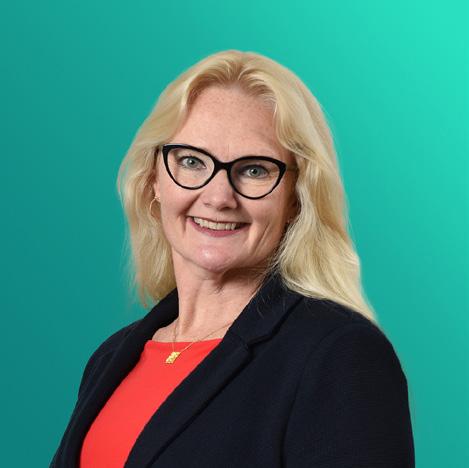Your investment update

Q2 2023 Succession Model Portfolios Powered by 7IM
This document has been produced by Seven Investment Management LLP from internal and external data. Any reference to specific instruments within this document are part of widely diversified portfolios and do not constitute an investment recommendation. You should not rely on it as investment advice or act upon it and should address any questions to your financial adviser. The value of investments can vary and you may get back less than you invested.
Contents Welcome Martyn Surguy Chief Investment Officer Strategy Don’t forget to remember Salim Jaffar Investment Analyst Culture Culture and sustainability at 7IM Verona Kenny Managing Director, Intermediary Featured topic Artificial Intelligence and investing Ben Kumar Head of Equity Strategy Visit us at www.7im.co.uk to find out more about our latest news and views. 04 06 12 14 Your Investment Update – Q2 2023 3
Welcome
Expectations and emotions
Understanding financial markets isn’t simply a question of getting to grips with the numbers. As we so often see, it’s also about understanding the expectations and emotions of investors. Entering 2023, there was a pervading sense of gloom, typified by almost every large investment bank prophesying a recession to come.
With hindsight, such a negative bias in outlook seems almost guaranteed to result in a strong period of returns, by setting a low bar to jump over. And indeed, despite a number of ongoing problems with the economic fundamentals, the first quarter of 2023 has been a relatively tranquil one for major global markets – especially US equities. Many of last year’s issues haven’t gone away; but have simply become accepted as normal. The Russian invasion of Ukraine, so shocking in 2022, is now established as an ongoing problem. Double-digit inflation is now embedded as the key issue for governments, rather than something just emerging. And it is now business as usual for the Bank of England (and all other Western central banks) to be increasing interest rates.
However, just because these circumstances have become more familiar to us all, doesn’t mean their economic impact is suddenly more benign. We find it hard to believe that the impact of rising interest rates, high inflation and geopolitical strife will be nicely contained within the 2022 calendar year. The global economy is a complex and slow-moving system – it takes time for changes to work their way through. After nearly 15 years of zero-interest rates, the sharp move away from that will have further consequences.
Many of last year’s issues haven’t gone away; but have simply become accepted as normal."
4 Your Investment Update – Q2 2023
The predictions for a recession in 2023 haven’t been proved false by a resilient first quarter. Many investors may be tempted to declare the difficult period to be over – especially as many of the recent winners are so familiar, with the large technology companies in the US dominating the rally. It can feel comfortable to be back in the same old winning positions from the last decade. It’s easier to believe that the world hasn’t changed too much.
But what’s comfortable is rarely the same as what’s profitable for long-term investors. Salim Jaffar takes you through more of the detail on our conviction about the uncomfortable changes still to come over the next few months. Meanwhile, Ben Kumar takes a step back to look at the blend of art, science and psychology at the core of our investment process, in the context of the developments in AI happening across the world.
Our conservative and diversified approach to investment is designed for these changing times. Recent rallies in the previous 'low-rate environment' winners have challenged our defensive outlook. However, we remain convinced that our portfolios are well placed to navigate the shocks that typically accompany the recession which follows a sharp rise in rates. Protecting our clients’ capital in the long term remains our most important goal.
MARTYN SURGUY
 Chief Investment Officer
Chief Investment Officer
Finally, I’m delighted to note, in my role as Chair of Diversity, Inclusion and Belonging at 7IM, that we also have a piece on culture and sustainability, written by Verona Kenny.
Enjoy reading!
It’s easier to believe that the world hasn’t changed too much. But what’s comfortable is rarely the same as what’s profitable for long-term investors."
5 Your Investment Update – Q2 2023
Strategy
Don’t forget to remember
Humans are guilty of many things, and forgetting is something we are all guilty of from time to time. The upshot of being forgetful can vary greatly, depending on context.
In 1999, NASA lost a $125 million Mars orbiter because some engineers forgot to convert imperial units to metric units. This led to a serious miscalculation of the spacecraft's trajectory, and it ultimately burned up in the Martian atmosphere.
A more topical example of forgetfulness is that of Silicon Valley Bank. The bank got so used to low rates that they pretty much forgot how to manage their risk for an environment where interest rates soar. André Esteves, co-founder of Brazil’s Banco BGT, sums it up well. He claims that “any junior analyst” from Latin America would have been able to manage the interest rate risk on SVB’s balance sheet.
Not because “SVB were morons and Latin American interns are smart”, but rather because “SVB had 15 years of low and stable interest rates and Latin American interns did not.” Rates in Latin America move around dramatically, so people are used to rates rising and don’t have time to forget that it can happen.
As investors, if we forget about something, that is unlikely to lead to an explosion, but the consequences for portfolios can be just as dire.
6 Your Investment Update – Q2 2023
At face value, you might think that the way interest rates impact the economy is simple. Higher rates mean money is more expensive, so people spend less and economic activity slows down. In reality, the process is much more complicated than that.

SALIM JAFFAR
What’s under the interest rate bonnet? US interest rates have sky-rocketed over the
12 months: Fed Fund Rate 0 00% 1 00% 2 00% 3 00% 4 00% 5 00% 6 00% 7 00% Data source: Bloomberg
past
7 Your Investment Update – Q2 2023
Investment Analyst
8 Your Investment Update – Q2 2023
The Transmission
Mechanism of Monetary Policy
O
Changes in risk premia
Changes in bank capital
Changes in the global economy
Changes in fiscal policy
1
Expectations and money market interest rates adjust quickly.
People stop speculating about the rate rise, because it has been announced, and short-term money market rates adjust pretty much instantly.
2
The impact on the next line down can be quick or slow.
• Asset prices can adjust quickly – discount rates have changed, which can be priced in easily (although this is only the first order effect)
• Bank rates adjust quickly
• Exchange rates will adjust for the change in relative interest rates between countries, which can take time
• The money/credit landscape changes. You pay more on floating rate loans, and you might be less inclined to take out loans that you now have to pay more for.
Continued
Strategy
1 2 3 4
cial interest rates Expectations Money market interest rates Wage and price-setting Supply and demand in goods and labour markets Domestic prices Import prices Price developments
Other than looking a bit like the London tube map, this flowchart from the European Central Bank highlights the complexity of how central bank rates impact the economy – what economists call the Transmission Mechanism of Monetary Policy: Money credit Asset prices Bank rates Exchange rates
Shocks outside the control of the central bank
Changes in commodity prices
This next line is much slower.
• Wage and price setting takes time. Most people negotiate their salary once a year. So, if your floating rate mortgage payments rise, you might have to wait a year to negotiate a higher salary to cover it. There’s also time and costs associated with your local grocer changing their prices
• Changes in the labour markets can take even longer. The higher cost of capital takes a long time to bite firms and laying off employees to make space for this takes even longer.
What the bulls are forgetting
Hopefully, that diagram will convince you that interest rates don’t impact the economy overnight. If you need more evidence, central banks themselves are the first to say that it takes time for the economy to fully feel the effects of rate rises:
• “Some estimates suggest that it takes between one and two years for monetary policy to have its maximum effect” – Reserve Bank of Australia
• “A large body of research tells us that it can take 18 months to two years or more for tighter monetary policy to materially affect inflation” – Federal Reserve Bank of Atlanta
As you can see from the chart, US rate hikes have only been going on for a year and are still happening. It will take a while yet for the economy to feel the full effect of these hikes.
The current hiking cycle has already pushed over a few dominoes. US inflation has started to tick down, some poorly risk-managed banks couldn’t keep up with outflows, and Credit Suisse – a non-profitable and reputationally damaged bank – was pushed over the edge by a combination of factors.
More dominoes will fall
The interest rate rises are still having their impact and more needs to happen for them to have their full desired effect on the economy – returning inflation to target levels. The domino that tends to precede inflation is unemployment. When unemployment rises, it’s harder for workers to negotiate higher wages, and the upwards pressure on prices subsides. US unemployment hasn’t really budged yet. It’s hovering around 3.5%, which is a historically low level.
This next line is just a function of the lines above.
• Domestic prices rely on changes in supply, demand, wages, and (of course) prices
• Import prices are impacted by interest rates.
To complicate things still more, throw in a load of potential exogenous shocks on the right-hand side of this framework that might happen, might not happen, or might all happen at the same time…
At this point in the cycle, being fickle and forgetting the past are especially dangerous. An investor with a short memory might be moving overweight equity because markets have rallied year to date, all the while forgetting that dramatic interest rate rises have happened and will take more time to feed through to the economy.
That is why we remain underweight equity risk. We believe that markets got overexcited about not very much at the start of the year. A couple of cracks have appeared, but the global economy has not felt the full impact of rate rises – this is yet to come. In this kind of environment, equity markets are unlikely to perform well. For us to change our core view, many more adjustments need to take place.
3
4
9 Your Investment Update – Q2 2023
We believe that markets got overexcited about not very much at the start of the year. A couple of cracks have appeared, but the global economy has not felt the full impact of rate rises – this is yet to come. In this kind of environment, equity markets are unlikely to perform well."
Salim Jaffar, Investment Analyst


Culture Culture and sustainability at 7IM
At 7IM, we are passionate about our culture and sustainability. But what do we really mean by this statement? We know that culture and sustainability, alongside diversity and inclusion, are terms more and more firms talk about.
But we have gone a step further and have challenged ourselves with putting a set of metrics around these terms.
We want to be able to show that all the initiatives and activity we undertake are resulting in real change, and the only way to demonstrate real change is to be able to measure it.
Our commitments
Cleaner investments
30% reduction in CO2 in SAA
• Climate risk embedded across all funds
• Increased voting and engagement on ESG
Sustainable choices 20% reduction in Scope 1, 2, 3 CO2 and carbonneutral from 2021
• Reduce travel by 20%
• Reduce paper use by 50%
• Reduce operational energy by 20%
• Maintain data centre efficiency ≤1.5 Power usage effectiveness (PUE)
What we cannot reduce, 7IM will offset.
Inclusive teams Achieve a diverse and equitable employee base
• Report against Bloomberg GEI
• Race at Work and Women in Finance Charter signatories
• Leading workplace policies
• 35% Executive Committee (ExCo) women by 2024
Giving back Support charities aiming to reduce inequalities
• One volunteering day p.a.
• £50,000 contribution p.a.
• Give As You Earn scheme
• Fundraising opportunities
12 Your Investment Update – Q2 2023
Cleaner Investments
30% reduction in CO2 in SAA
• In November 2022, we moved closer to achieving our goal to reduce the carbon intensity of the Strategic Asset Allocation (SAA) – which acts as the long-term plan for all our investment portfolios – by 30% by 2026
• Following research into the asset classes that form our SAA, we realised we could find investments in corporate bonds with a similar return profile to the traditional corporate bond benchmarks, but with much less exposure to carbon-intensive companies
• Our chosen investment is approximately 70% less carbon-intensive than the fund we previously held and can be accessed at a lower cost
• At the time of writing, the Investment Management team has invested £140m into the new low-carbon fund and plan to invest a further £65m before the end of the year.
Sustainable choices
20% reduction in Scope 1, 2, 3 CO2 and carbonneutral from 2021
• 7IM has partnered with World Land Trust as part of our commitment to offset our carbon footprint
• This partnership allows us to support World Land Trust’s Carbon Balanced project in Guatemala, which is working with hundreds of landowners, including local communities, to register and obtain land titles to protect 133,827 acres of threatened coastal forest for the benefit of the region’s biodiversity.
Inclusive team
Achieve a diverse and equitable employee base
• In a male-dominated industry, we are making strides in creating a more diverse workforce and we have seen our percentage of women in the business increase from 35% in Q4 2021 to 38% in Q4 2022.

Giving back
Support charities aiming to reduce inequalities
• As a company, we will donate a minimum of £50,000 during 2023 to the charities for which we will undertake various fundraising activities
• We have introduced our Volunteering Policy, enabling 7IM colleagues more opportunities to give back
• We also offer a Give As You Earn scheme, allowing 7IM colleagues more opportunities to give back.
Managing Director, Intermediary VERONA KENNY
13 Your Investment Update – Q2 2023
Featured topic
Artificial Intelligence and investing
Will 7IM become 7 'AI' M?
In November 2022, the world was introduced to ChatGPT.1 A few months later, 100 million people are using the AI chatbot to answer questions, solve problems and, for some reason, write vast amounts of poetry involving everyday items.
Another thing people have taken to doing is ask Chat-GPT to build investment portfolios. As with lots of the service industries, it’s a natural response. After all, the main input into investing (and law, accountancy, auditing, consulting, etc.) is the human brain – so seeing if the artificial brain can have a go makes sense. And the results are… okay.
The various portfolios ChatGPT spits out are reasonable approaches to long-term asset allocation. Broadly diversified, plenty of growth assets, a few defensive ones, maybe the odd sprinkling of gold or property.
Not a bad start – at the same time though, not game-changing. Of course, it’s early days. Bloomberg have just announced their GPT version, trained on billions of market data points, and aimed specifically at finance. New technological development is exciting. It got us thinking about how using AI could improve our investment process. We’ve always believed that successful long-term investing needs a blend of art and science, with a healthy dose of psychology layered on top. There’s potential in all three areas.
1 GPT stands for “Generative Pre-trained Transformer”
14 Your Investment Update – Q2 2023
The science
Our fundamental investment framework is based on statistics. We spend a lot of time reading the latest methodological research, looking for longerterm datasets, and thinking about procedural improvements, to identify the right long-term blend of assets for any given risk profile.

At all stages of that process, AI can help us get better. If you’ve ever read an academic paper written by mathematicians, you’ll understand why asking a nonhuman to read and summarise it might be better for everyone!2
And when looking at new datasets, or applying new methods, AI can be extremely helpful in having a first go at analysis. It can write code, apply it, and then display the results – which allows us to think about the answers, and then ask different or more detailed questions.
Being able to repeat and enhance our scientific methods quickly (and without the very human frustration that comes with doing repetitive tasks) should allow us to take deep research insights and apply them far more efficiently.
2 I did study maths so I’m not just taking pot-shots!
of Equity Strategy BEN KUMAR
We’ve always believed that successful long-term investing needs a blend of art and science, with a healthy dose of psychology layered on top. There’s potential in all three areas."
Head
15 Your Investment Update – Q2 2023
Featured topic Continued
The art
We’ve always believed that investing requires art as well as science. The past can’t tell you everything – the future is created rather than predicted, and things can change in unexpected ways at unanticipated speeds.
But all creative processes need a starting point. Michelangelo didn’t just pick up a chisel and head for the nearest block of marble. Beethoven needed piano lessons, and Shakespeare took his inspiration from history. Art requires just as much research and planning as financial modelling – so there’s certainly room for assistance.
When thinking about a new potential investment opportunity, why not ask an AI assistant to provide a general summary of the current state of the world, or collate predictions, or form likely scenarios? The act of gathering research isn’t the value that an artist/investor can add – it’s what they do with that research.
The psychology
Understanding psychology is crucial for successful investing. Without humanity, there are no markets. So whether it’s understanding limits of our own rationality when it comes to decision-making, or recognising the emotional responses of other investors, the human element is unavoidable.
This is the most exciting aspect of working with AI. In most scientific analysis, research takes place from an external perspective. We study the stars, or atomic reactions, or ecosystems from the outside. And every time we find a way to get a new perspective, we learn. A better telescope, or hadron collider, or undiscovered species always tells us something!
But with psychology, we are the subjects and the researchers! It’s unavoidable. The brain is trying to understand and analyse itself. There’s a distinct possibility that a different cognitive approach might tell us something about ourselves that we’ve never considered.
How that interacts with investment is too soon to tell –after all, behavioural economics (which incorporates psychology) has only been on the scene since the 1970s. There’s a lot of scope for discovery!
16 Your Investment Update – Q2 2023
More than just a tool
We need to change the way we think about AI if we want to interact properly and get as much as possible from it. Using AI isn’t like having a software update on your PC, or a more powerful drill, or a more efficient battery.
Interactions with AI are going to be more like having a new colleague; someone who has a completely different skillset and different method of thinking to you. This could happen sooner than most people expect.
At 7IM, we have an investment environment where we try as hard as possible to encourage diversity of thought. We want to bring as many different, well-informed perspectives as possible to everything we do. Having a non-human perspective as one of those might just deliver something unique…
Interactions with AI are going to be more like having a new colleague; someone who has a completely different skillset and different method of thinking to you."
17 Your Investment Update – Q2 2023
Meet the teams
Investment Management Team
Martyn Surguy Chief Investment Officer ACA Chartered Accountant, MCSI, CISI Level 4, 35 years of industry experience.
Matthew Yeates Deputy Chief Investment Officer CFA, FRM, BA Economics, 11 years of industry experience.
Uwe Ketelsen Head of Portfolio Management MEcon, CFA, 26 years of industry experience.
Terence Moll Head of Investment Strategy and ESG MPhil, PhD. in Economics, 31 years of industry experience.
Duncan Blyth Senior Investment Manager BSc Actuarial Mathematics & Statistics, CFA, 26 years of industry experience.

Hugo Brown Investment Analyst – Alternatives BEng, CFA level 3 Candidate, 4 years of industry experience.

Christopher Cowell Senior Quantitative Investment Strategist MSc, PhD, CFA, 6 years of industry experience.

Ross Brydon Investment Implementation Manager BA in Finance, 4 years of industry experience.






Fiammetta Valentini Investment Manager MSc in Accounting, Financial Management and Control, 4 years of industry experience.

Tiziano Hu Quantitative Investment Strategist – Multi Asset MSc in Financial Technology, 2 years of industry experience.

Salim Jaffar Investment Analyst BA in Economics, IMC, 2 years of industry experience.
Ben Kumar Head of Equity Strategy CFA, MSc Behavioural Economics, 10 years of industry experience.
Tony Lawrence Head of Model Portfolio Management CFA and CAIA, 21 years of industry experience.
Stephen Penfold Senior Investment Manager BSc in Economics & Computing, 36 years of industry experience.



Peter Sleep Senior Investment Manager 30 years of industry experience.
Ahmer Tirmizi Head of Fixed Income Strategy MSc in Economics and Finance, 15 years of industry experience.



Jack Turner Head of ESG Portfolio Management CFA, 14 years of industry experience.

Wenqian Zeng Junior ESG Investment Analyst MSc in Climate Change, Management and Finance, BSc in Management, 1 year of industry experience.

Risk Team
Joe Cooper
Head of Risk and Portfolio Analytics

CFA, MSc in Applied Economics, 11 years of industry experience.
Loic Yegba
Investment Risk Developer
MSc Mechanical Engineering, CFA level 3 candidate.
William Wood
Investment Risk and Performance Analyst
BSc in Physics, 4 years of industry experience.
Matthew Hall
Investment Risk & Performance Analyst
MSc Finance, 2 years industry experience.




Seven Investment Management LLP is authorised and regulated by the Financial Conduct Authority. Member of the London Stock Exchange. Registered office: 55 Bishopsgate, London EC2N 3AS. Registered in England and Wales number OC378740. Succession Advisory Services Ltd is authorised and regulated by the Financial Conduct Authority. Registered Office: Drake Building, 15 Davy Road, Plymouth Science Park, Derriford, Plymouth PL6 8BY. Registered in England and Wales number 06711051. www.7im.co.uk


 Chief Investment Officer
Chief Investment Officer




























